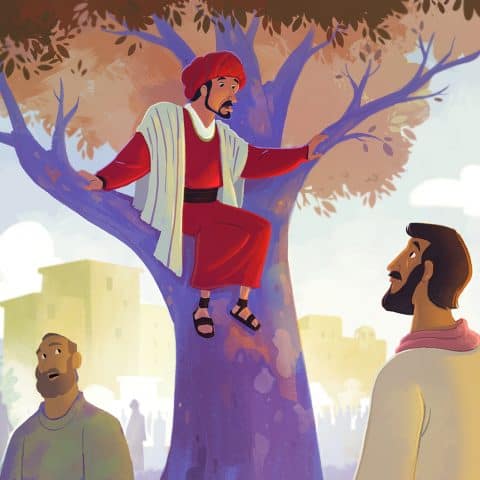Zacchaeus, a prominent character in the New Testament, is best known for his encounter with Jesus in the Gospel of Luke. His story provides profound insights into themes of repentance, redemption, and the transformative power of encountering Christ.
Background and Context
- Name: Zacchaeus
- Occupation: Chief tax collector
- Location: Jericho
- Biblical Reference: Luke 19:1-10
Tax collectors in the time of Jesus were often viewed with disdain by the Jewish community. They were seen as traitors who collaborated with the Roman occupiers and often engaged in corrupt practices to enrich themselves. Zacchaeus, being a chief tax collector, would have been particularly wealthy and likely even more despised.
The Encounter with Jesus
The story of Zacchaeus unfolds as Jesus enters Jericho, where a large crowd has gathered to see Him. Due to his short stature, Zacchaeus climbs a sycamore tree to get a better view of Jesus. This act demonstrates his determination and desire to see Jesus despite his social status and physical limitations.
- Luke 19:3-4: "He wanted to see who Jesus was, but because he was short, he could not see over the crowd. So he ran ahead and climbed a sycamore-fig tree to see him, since Jesus was coming that way."
Jesus stops under the tree, looks up, and calls Zacchaeus by name, telling him to come down because He must stay at his house that day. This personal call from Jesus highlights His willingness to reach out to those considered outcasts.
- Luke 19:5: "When Jesus reached the spot, he looked up and said to him, 'Zacchaeus, come down immediately. I must stay at your house today.'"
Zacchaeus’ Response
Zacchaeus joyfully welcomes Jesus into his home, and this encounter marks a turning point in his life. He publicly declares his intention to give half of his possessions to the poor and to repay anyone he has cheated four times the amount.
- Luke 19:8: "But Zacchaeus stood up and said to the Lord, 'Look, Lord! Here and now I give half of my possessions to the poor, and if I have cheated anybody out of anything, I will pay back four times the amount.'"
This declaration is significant as it demonstrates true repentance and a commitment to righting his wrongs. In response, Jesus affirms Zacchaeus’ salvation, stating that he, too, is a son of Abraham and that salvation has come to his house.
- Luke 19:9-10: "Jesus said to him, 'Today salvation has come to this house, because this man, too, is a son of Abraham. For the Son of Man came to seek and to save the lost.'"
Transformation and Ministry
The transformation of Zacchaeus did not end with his repentance. Tradition holds that Zacchaeus’ life was profoundly changed after his encounter with Jesus:
- Bishop of Caesarea: Early church tradition states that Zacchaeus became the first bishop of Caesarea. This role would have placed him in a position of significant spiritual leadership and responsibility within the early Christian community.
- Ministry and Service: As bishop, Zacchaeus would have been involved in teaching, pastoral care, and possibly the ordination of other church leaders. His ministry would have focused on spreading the teachings of Jesus and caring for the spiritual needs of the believers in his community.
Key Themes and Lessons
- Repentance and Redemption: Zacchaeus’ story underscores the power of repentance and the possibility of redemption, regardless of one's past actions.
- Inclusivity of Jesus' Ministry: Jesus' willingness to associate with Zacchaeus, a social outcast, highlights the inclusive nature of His ministry.
- Transformative Encounter: An encounter with Jesus can lead to profound personal transformation and a commitment to justice and restitution.
- Leadership and Service: Zacchaeus’ transition from a tax collector to a church leader demonstrates the impact of genuine transformation on one's vocation and service to others.
The story of Zacchaeus is a powerful testament to the grace and transformative power of Jesus. It encourages believers to seek Jesus earnestly, repent sincerely, and embrace the changes that come from a true encounter with Christ. Zacchaeus’ willingness to make amends for his past actions serves as a model for genuine repentance and the fruits it should bear. His subsequent role as a bishop highlights how a transformed life can lead to impactful ministry and service within the Christian community.
